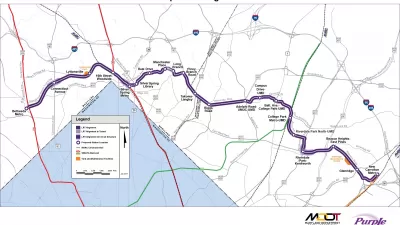To finance and construct a new $2.2 billion light rail line in the D.C. suburbs, Maryland will seek to enter into a unique private sector partnership. The ambitious strategy is drawing concern from lawmakers.
In this era of tight budgets and federal gridlock, cities and states are taking it upon themselves to find innovative ways to fund desirable infrastructure projects. Maryland is one of the states dipping its toes in the public-private partnership waters with a plan to design and build a 16-mile light rail line with the help of the private sector.
"Maryland transportation officials say such a partnership would take advantage of the private sector’s light-rail expertise and require the companies to assume the financial risks of any construction delays or cost overruns," explains Katherine Shaver. "The efficiencies gained from one private entity overseeing all aspects — from the drawing board to bulldozers to trains on tracks — are projected to save up to 20 percent over 35 years, officials say."
However, "[t]he approach, while considered innovative, is drawing scrutiny," she adds. "State Sen. Richard S. Madaleno Jr. (D-Montgomery), who reviewed the plan as a member of the Senate Budget and Taxation Committee, said he considers it a 'very risky proposition.'”
“It’s attractive. It’s an innovative approach,” Madaleno said. “But we don’t have very many, if any, examples of how this works out.”
UPDATE (10/16/13): The vote on whether to pursue the plan has been delayed until November 6.
FULL STORY: Purple Line: Public-private transit partnership would be one of the broadest in U.S.

Alabama: Trump Terminates Settlements for Black Communities Harmed By Raw Sewage
Trump deemed the landmark civil rights agreement “illegal DEI and environmental justice policy.”

Study: Maui’s Plan to Convert Vacation Rentals to Long-Term Housing Could Cause Nearly $1 Billion Economic Loss
The plan would reduce visitor accommodation by 25% resulting in 1,900 jobs lost.

Planetizen Federal Action Tracker
A weekly monitor of how Trump’s orders and actions are impacting planners and planning in America.

Study Links Covid and Poor Driving
The effects of the virus, including ‘brain fog,’ can make driving more difficult and dangerous.

Waymo Gets Permission to Map SF’s Market Street
If allowed to operate on the traffic-restricted street, Waymo’s autonomous taxis would have a leg up over ride-hailing competitors — and counter the city’s efforts to grow bike and pedestrian on the thoroughfare.

Parklet Symposium Highlights the Success of Shared Spaces
Parklets got a boost during the Covid-19 pandemic, when the concept was translated to outdoor dining programs that offered restaurants a lifeline during the shutdown.
Urban Design for Planners 1: Software Tools
This six-course series explores essential urban design concepts using open source software and equips planners with the tools they need to participate fully in the urban design process.
Planning for Universal Design
Learn the tools for implementing Universal Design in planning regulations.
Caltrans
Smith Gee Studio
Institute for Housing and Urban Development Studies (IHS)
City of Grandview
Harvard GSD Executive Education
Toledo-Lucas County Plan Commissions
Salt Lake City
NYU Wagner Graduate School of Public Service



























